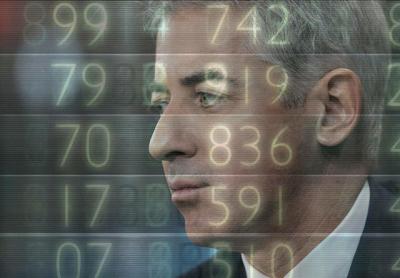Short Expectations: ‘Betting on Zero’

“Betting on Zero” isn’t your typical summer blockbuster, even for a documentary. There are no absolute winners and, arguably, no clear heroes. It’s not about kids or animals, and it is set in the until-recently lackluster world of finance.
That said, “Betting on Zero” evolves into a compelling story that centers on one man’s quest to take down a company for financial gain as well as an overriding sense that it has a flawed and harmful business model. It will be shown at Guild Hall on Aug. 6, the second in the Hamptons International Film Festival’s SummerDocs program.
Theodore Braun, the director, said his interest in Bill Ackman’s crusade against the company Herbalife evolved from his curiosity about how money functioned in American life after seeing how it worked in the operation of international justice in his 2007 film “Darfur Now.” After teaming up with Glen Zipper, the producer, they began exploring several stories involving American corporate conflict.
In December 2012, Mr. Ackman asserted that Herbalife, a California company that sells shakes and other nutritional products, was a pyramid scheme that defrauded its distributors. He and his hedge fund, Pershing Square, took a $1 billion dollar position against the company by shorting its stock, under the assumption that the government would shut it down and its market value would fall to zero.
“The idea of a hedge-fund billionaire on a moral crusade against a company that promises health, wealth, and a shot at the American dream caught my eye.” Mr. Braun said, in what could be the film’s elevator pitch. “The fact that it was unfolding in a present-tense battle that was likely to be resolved in a short period of time made it seem like it would be a good subject.”
The Federal Trade Commission, however, ended up taking more than two years to wrap up its investigation of Herbalife. It announced its findings on July 15. “The length of time it took for the F.T.C. to act surprised me and surprised everyone involved,” he said. The filmmakers went into production within a month or so of the announcement of the investigation. “Everyone at that point thought it would be wrapped up in a matter of months.”
As it dragged on, they followed Mr. Ackman and his actions during the period and interviewed executives and distributors of Herbalife who ultimately declined to be included in the film. Instead, the filmmakers had to rely on public statements and taped interviews by news organizations to relay that side of the story.
The film became framed on a failed attempt by Mr. Ackman to persuade investors that Herbalife’s business model was unsustainable and how he got to that point, including his decision to short the company. This included interviewing and following the activities of distributors who lost significant amounts money trying to sell Herbalife’s products using its business model.
Supporters of the company have questioned the perspective presented in the documentary. Although Herbalife did not participate, the company’s “point of view is fully and scrupulously presented,” Mr. Braun said. Based on many off-the-record interviews with both present and former executives and distributors, “their point of view and understanding of what they’re doing, and their take on Ackman’s short and on what the company is all about is represented quite fully and fairly.”
He said that not having Herbalife’s participation cost his team a great deal of time and money, both in the several-month effort to interview Herbalife representatives and then having to rethink the film and track down available footage. “All of us on the film were curious about the battle. We didn’t have a dog in the fight. We wanted to understand what was really going on and how it would all play out.”
The film premiered at the Tribeca Film Festival in April in the absence of the F.T.C.’s findings. Without its verdict, the filmmakers had to find a satisfying way to end the film while the story was still unfolding. “The verdict was left hanging in a way that we were not able to clearly indicate how the audience should regard what we presented.”
He said the filmmakers were pleased that “the F.T.C.’s findings were so in sync with what we found in our own two years of work.” Edith Ramirez, the commission’s chairwoman, said in her announcement, “This settlement will require Herbalife to fundamentally restructure its business so that participants are rewarded for what they sell, not how many people they recruit. . . . Herbalife is going to have to start operating legitimately, making only truthful claims about how much money its members are likely to make, and it will have to compensate consumers for the losses they have suffered as a result of what we charge are unfair and deceptive practices.”
In the announcement, the chairwoman did not call Herbalife a “pyramid scheme” specifically. Carl Icahn, an investor in and supporter of Herbalife, issued a statement saying that the F.T.C. concluded that Herbalife was not a pyramid scheme. Ms. Ramirez said she did not agree. Yet, her Sphinx-like response — “They were not determined not to be a pyramid” — left some people’s heads spinning.
Audience members at the film’s screening at Guild Hall will see end cards in the film that reflect the new information. “Because the F.T.C.’s complaint is so in concert with what the viewers will have experienced in the film, the slight changes will feel very satisfying and will wrap it up in a nice package,” Mr. Braun said.
Eventually, “There may be additional footage. . . . We want an ending that reflects the F.T.C. decision.” He said the drama of what went on the day of the commission’s announcement, Mr. Icahn’s press release, the F.T.C.’s refutation of the press release, and the market’s reaction are all things he would love to explore “if money and time were not an object.”
